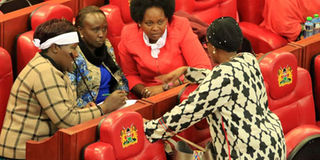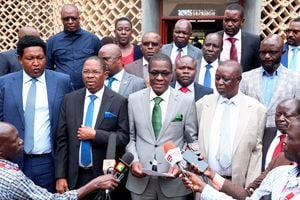Women MPs say gender bill not meant to create new posts for allies

Some MPs hold a discussion during the debate on the Constitution of Kenya (Amendment) Bill 2018 in the House on November 21, 2018. PHOTO | JEFF ANGOTE | NATION MEDIA GROUP
What you need to know:
The bill seeks to ensure that both Houses comply with the two-third gender requirement.
Kimilili MP Didmus Barasa said that the bill is not bad, but noted that there must be a nomination procedure so that deserving cases are not sacrificed at the altar of political interests.
Women MPs have defended the gender bill, saying that it will not benefit “slay queens” or girlfriends and boyfriends of the political and business class as insinuated by some of their male colleagues.
This comes as Tongaren MP Eseli Simiyu described the bill as a manifestation of laziness in complying with the constitutional requirement that not more than two-third holders of appointive and elective seats in public office shall be of the same gender.
'ETHNIC MINORITIES'
Woman Representatives Faith Gitau (Nyandarua) and Sabina Chege (Murang’a) said that the Constitution of Kenya (Amendment) Bill 2018 is not only about women, but also promotion of representation of marginalised groups such as the disabled, youth, ethnic minorities, and the National Assembly is required to enact it to be in sync with Article 81 (b) of the Constitution.
“This bill is not about slay queens, boyfriends or girlfriends of the politically connected. It is about the women of Kenya,” Ms Gitau said with Ms Chege adding that it is time Parliament passed the law or risk dissolution.
The bill is set for voting on Tuesday next week and requires a two-thirds majority or 233 of the 349 MPs in the National Assembly to sail through and allow Article 97 of the Constitution to be amended to pave the way for extra nomination seats for women other than the 12 provided.
The two lawmakers' defence of the bill, sponsored by Majority Leader Aden Duale, came as nominated MP David Sankok said that passage of the bill will not benefit women in rural areas as it will lead to the nomination of those close to political power.
'POLITICAL INTERESTS'
Kimilili MP Didmus Barasa said that the bill is not bad, but noted that there must be a nomination procedure so that deserving cases are not sacrificed at the altar of political interests.
“We are not opposed to women getting more seats, what we want to know is the formula being used in this because our women will be at the mercy of their party leaders,” Mr Barasa said.
But even as those in support rallied their colleagues, Dr Simiyu proposed a change in the electoral system as the ultimate formula to solving gender disparity in public bodies.
“This bill is trying to solve a complex problem through a lazy legislation,” he said.
Though the bill has a sunset clause of 20 years, the Tongaren MP said that women will not have been empowered enough and given the required mentorship by the time it lapses.
“Let’s look at the electoral laws. Is the first-past-the-post the best electoral system? Let’s consider proportional representation to have women and youth catered for without bloating this House. This one is too lazy and it won’t work,” the MP said.
EXPERTS
Proportional representation where parties are allocated seats in Parliament according to their parliamentary strengths has been favoured by electoral experts.
This model allows parties to nominate their members as opposed to the winner takes it all or the first-past-the-post.
Nevertheless, Kandara MP Alice Wahome said the House risks dissolution if the proposed law is not passed.
This is because anyone can move to court and petition for the dissolution of Parliament for failing to enact the law within the required timeframe.
The law was due in 2015, five years after the promulgation of the new Constitution.
However, Parliament amended the Constitution to extend the period of passage by two more years.
“Let’s affirm the position of the boy-child because marginalisation can also catch up with him. In 2016, the Supreme Court gave this House up to August of 2016 to come up with this legislation but it has never happened,” Ms Wahome said.





